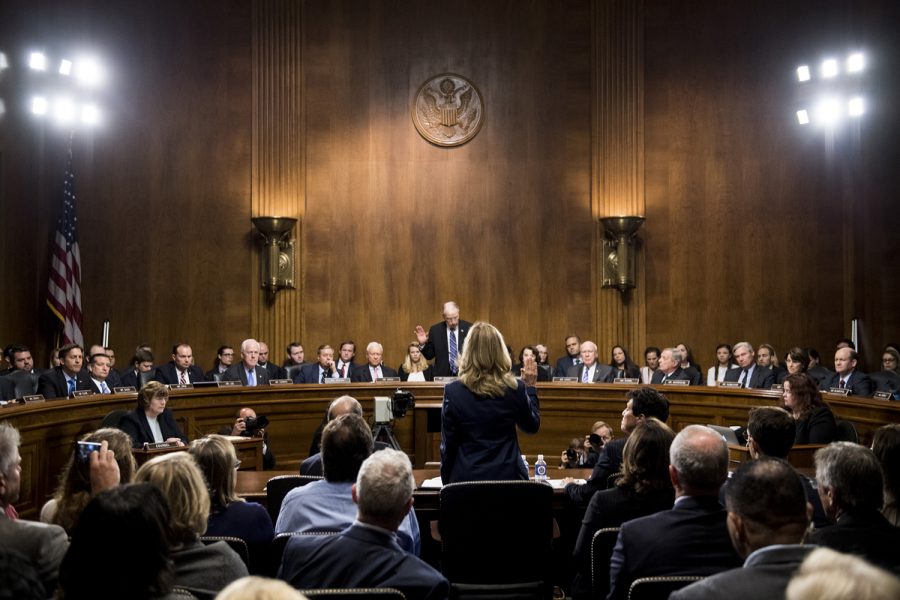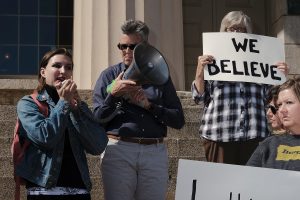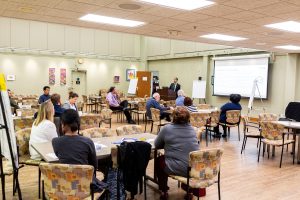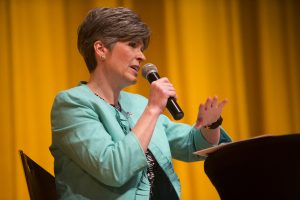Brett Kavanaugh, Christine Blasey Ford testimonies highlight Chuck Grassley’s role in ‘Me Too’ moment
Sen. Chuck Grassley again plays a role in hearings regarding sexual-assault allegations against Supreme Court nominees.
Dr. Christine Blasey Ford is sworn in by chairman Chuck Grassley (R-Iowa) on Thursday, Sept. 27, 2018, during the Senate Judiciary Committee hearing on the nomination of Brett M. Kavanaugh to be an associate justice of the Supreme Court of the United States, focusing on allegations of sexual assault by Kavanaugh against Christine Blasey Ford in the early 1980s. (Tom Williams/Pool/CQ Roll Call/Abaca Press/TNS)
September 27, 2018
Iowa Sen. Chuck Grassley, who chairs the Senate Judiciary Committee, oversaw hearings Thursday in which both Christine Blasey Ford and Supreme Court nominee Brett Kavanaugh testified in front of the committee and the nation over allegations of sexual assault when the pair was in high school.
“I want to apologize to you both for the way you’ve been treated and I intend for today’s hearing to be safe and comfortable and dignified for both of our witnesses,” Grassley said Thursday during his opening remarks.
Following Thursday’s hearing, the committee confirmed it would stick to the scheduled Friday vote to approve Kavanaugh’s nomination. If the committee confirms, the full Senate vote could occur as soon as next week.
The Friday vote will come less than 24 hours after the committee heard testimony from both Kavanaugh and Ford. Senators have compared Thursday’s testimony from Ford to that of Anita Hill, a lawyer who accused then-Supreme Court nominee and current Associate Justice Clarence Thomas of sexual harassment 27 years ago.
At the time, Grassley was a member of the Judiciary Committee.
Sen. Patrick Leahy, D-Vt., also a member at the time, reminded Grassley of the hearings in calling for an FBI investigation.
“Chairman, you and I were here 27 years ago … we failed Anita Hill,” Leahy said. “We are doing a lot less for these women today.”
The current ranking Democrat, California Sen. Dianne Feinstein, won her seat the year after the hearings in what was known as “the year of the woman.”
“While young women are standing up and saying no more, our institutions have not progressed in how they treat women who come forward,” Feinstein remarked Thursday in her opening statement.
She recounted her memory of watching Hill testify before the Senate Judiciary Committee while in an airport.
“What I saw was an attractive woman in a blue suit in front of an all-male judiciary committee speaking of her experience of sexual harassment,” Feinstein said. “She was treated badly, accused of lying, attacked, and her credibility put to the test throughout the process.”
Ford requested an FBI investigation into her allegations, similarly to Hill in 1991. Grassley explained his reasoning for not supporting an investigation from the bureau in a Sept. 19 conference call with reporters and in public statements thereafter.
“Nobody knew who was involved in Anita Hill[‘s case]. And they needed to find that out,” Grassley told reporters. “We know everybody that’s been involved in this instance and we have contacted them for information.”
Feinstein criticized Grassley and other Republicans for this, contending an FBI investigation would be a normal process squarely in the bureau’s jurisdiction.
Grassley, in response, has criticized Feinstein for withholding Ford’s letter.
Feinstein also pointed out other differences in the seemingly similar allegations from Hill’s and Ford’s against judicial nominees. She noted the lack of witnesses besides the accuser and the accused in the current hearing, and the smaller time frame in which the hearing was to take place.
“What I find most inexcusable is this rush to judgement,” Feinstein said Thursday. “The unwillingness to take these kinds of allegations at face value and look at them for what they are, a real question of character for someone who is asking for a lifetime appointment on the Supreme Court.”
In her testimony, Ford outlined the night she was allegedly assaulted by Kavanaugh at a party when the two were high school students in Maryland as well as the lasting effects on her today.
“For a very long time I was too afraid and ashamed to tell anyone these details,” Ford said during her opening statement Thursday. She said during her testimony that she was “100 percent certain” Kavanaugh was the one who assaulted her.
Kavanaugh, in his testimony, categorically denied the allegations.
“I’m not questioning that Dr. Ford may have been sexually assaulted by some person in some place at some time. But I have never done this. To her or to anyone. That’s not who I am. It is not who I was. I am innocent of this charge,” Kavanaugh said during his opening remarks.
Grassley had expressed his want to speak with Ford since her allegations of sexual assault were published in The Washington Post.
“She deserves to be heard,” Grassley has said on numerous occasions in reference to the hearing.
A timeline of Brett Kavanaugh’s confirmation process
- June 27: President Trump announced a list of 25 possible candidates for the U.S. Supreme Court seat.
- July 10: Brett Kavanaugh was named President Trump’s nominee to replace Anthony Kennedy on the U.S. Supreme Court.
- July 30: The date on a letter Christine Blasey Ford sent to ranking Democratic member of the committee, Dianne Feinstein, D-Calif.
- Aug. 10: Senate Judiciary Committee chairman Chuck Grassley, R-Iowa, announced Kavanaugh’s confirmation hearing would begin following the Labor Day Holiday.
- Sept. 4: The Senate Judiciary Committee began holding hearings with Kavanaugh.
- Sept. 7: Kavanaugh’s confirmation hearing concludes with testimony from legal experts and witnesses regarding his nomination.
- Sept. 16: Christine Blasey Ford told The Washington Post of her allegations against Brett Kavanaugh. It was the first time Kavanaugh’s accuser’s name was made public.






